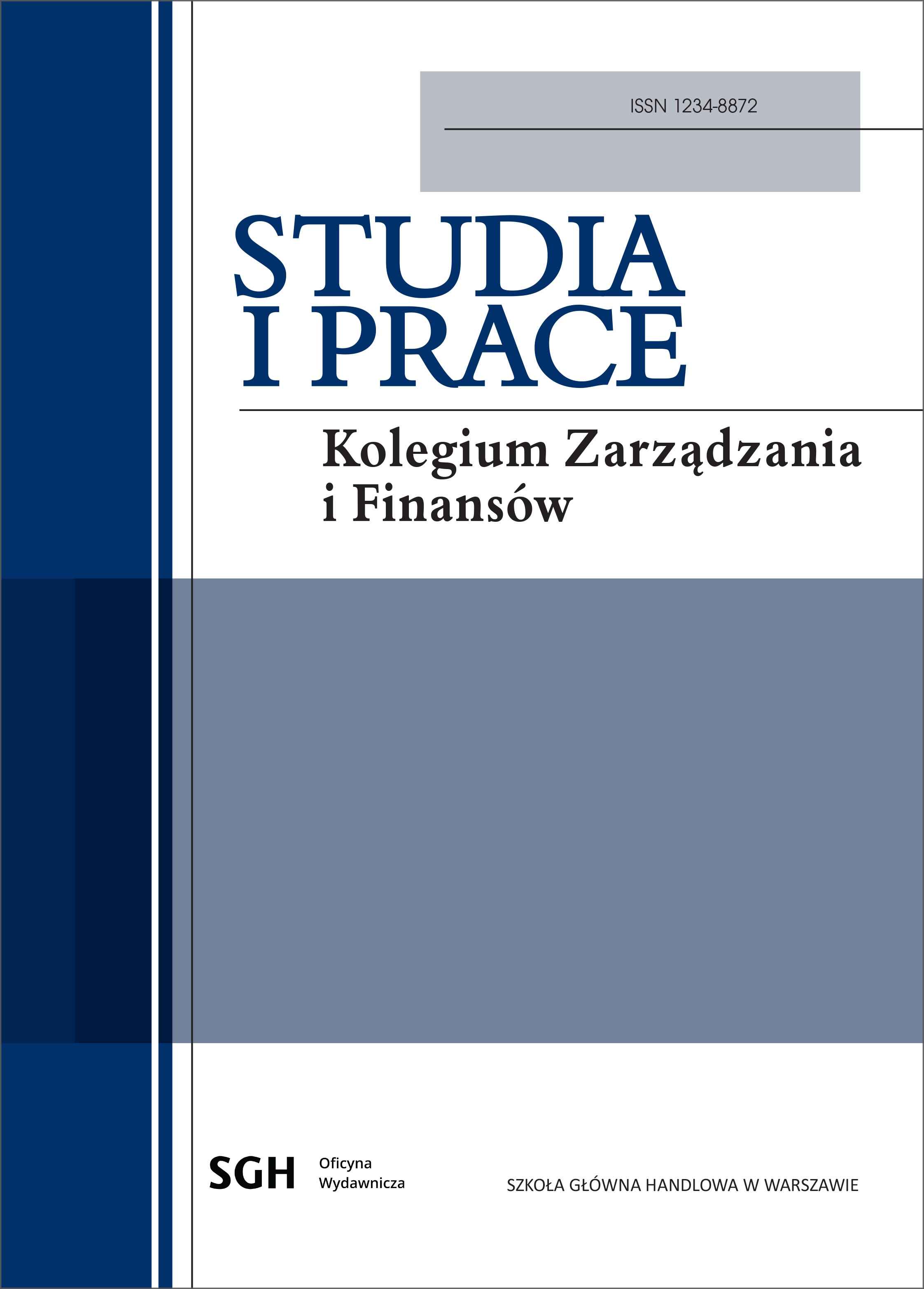Wpływ odpowiedzialnego zarządzania na ograniczenie negatywnych skutków pandemii
DOI:
https://doi.org/10.33119/SIP.2022.184.9Słowa kluczowe:
odpowiedzialne zarządzanie, pandemia COVID-19, praktyki odpowiedzialengo zarządzaniaAbstrakt
Przejście w kierunku stosowania odpowiedzialnych praktyk zarządzania przedsiębiorstwem wymaga zmiany w wielu obszarach funkcjonowania przedsiębiorstwa. Dodatkowym wyzwaniem jest ich realizacja w warunkach zmian działalności przedsiębiorstw wywołanych pandemią COVID-19. Jednym z kierunków działań w tym czasie jest przyjęcie strategii zarządzania uwzględniającej równowagę interesów społecznych, środowiskowych i ekonomicznych. Celem niniejszego artykułu jest analiza praktyk odpowiedzialnego zarządzania podejmowanych przez przedsiębiorstwa w obszarze zarządzania, ze szczególnym uwzględnieniem wpływu pandemii wywołanej wirusem SARS-CoV-2. Podstawę do wnioskowania stanowiły wyniki badań przeprowadzonych w sierpniu 2021 r. na próbie badawczej 1007 celowo dobranych małych, średnich i dużych przedsiębiorstw w ramach projektu badawczego pn. „Barometr odpowiedzialnego zarządzania” prowadzonego przez Instytut Zarządzania SGH.
Downloads
Bibliografia
2. Badania statutowe Instytutu Zarządzania, nr KZiF/S21/1.55, przygotowane w ramach dotacji MNiSW na utrzymanie i rozwój potencjału badawczego KZiF w 2021 r., pn. „Barometr odpowiedzialnego zarządzania”.
3. Beland L.‑P., Brodeur A., Wright T. [2020], The short-term economic consequences of Covid-19: exposure to disease, remote work and government response, IZA Institute of Labor Economics, https://www.iza.org/publications/dp/13159/the-short-term-economicconsequences-of-covid-19‑exposure-to-disease-remote-work-and-government-response.
4. Brakman S., Garretsen H., van Witteloostuijn, A. [2020], The turn from just-in-time to justin case globalization in and after times of COVID-19: an essay on the risk re-appraisal of borders and buffers, „Social Sciences and Humanities Open”, vol. 2, no. 1, s. 1–24.
5. Brown R., Rocha A. [2020], Entrepreneurial uncertainty during the COVID-19 crisis: mapping the temporal dynamics of entrepreneurial finance, „Journal of Business Venturing Insights”, 14.6. BSR/GlobeScan [2019], The State of Sustainable Business 2019, Results of the 11th Annual State of Sustainable Business Survey, https://globescan.com/wp-content/uploads/2019/11/BSR-GlobeScan-State-of-Sustainable-BusinessSurvey-FinalReport-12Nov2019.pdf, dostęp: 22.03.2020.
7. Carroll A. B., Adler N. J., Mintzberg H., Cooren F., Suddaby R., Freeman R. E., Laasch O. [2020], What ‘are’ responsible management? A conceptual potluck, w: The Research Handbook of Responsible Management, red. O. Laasch, R. Suddaby, R. E. Freeman, D. Jamali, Edward Elgar, Cheltenham.
8. Chek I. T., Mohamad Z. Z., Yunus J., Norwani N. M., Corporate social responsibility (CSR) disclosure in consumer products and plantation industry in Malaysia”, „American International Journal of Contemporary Research”, vol. 3.
9. Dow Jones [2009], Dow Jones Sustainability Indexes, Corporate Sustainability, http://www.sustainabilityindexes.com/07_htmle/sustainability/corpsustainability.html.
10. El Goul S., Guedhami O., Kwok C., Mishra D. R. [2011], Does corporate social responsibility affect the cost of capital?, „Journal of Banking and Finance”, vol. 35.
11. Elkington J. [1994], Towards the Sustainable Corporation: Win-Win-Win Business Strategies for Sustainable Development, „California Management Review”, 36 (2), s. 90–100.
12. Guthrie J. [1993], Australian public business enterprises: analysis of changing accounting, auditing, and accountability regimes, „Financial Accountability and Management”, vol. 9, no. 2, s. 101–114.
13. Keijzers G. [2002], The Transition to the Sustainable Enterprise, „Journal of Cleaner Production”, 10 (4), s. 349–359.
14. Kuckertz A., Brändle L., Gaudig A., Hinderer S., Morales Reyes C. A., Prochotta A., Steinbrink K. M., Berger E. [2020], Startups in times of crisis – A rapid response to the COVID-19 pandemic, „Journal of Business Venturing Insights”, 13, e00169. DOI:10.1016/j.jbvi.2020. e00169.
15. Pache A., Santos F. [2013], Inside the hybrid organisation: selective coupling as a response to competing institutional logics, „Academy of Management Journal”, vol. 56, no. 4, s. 972–1001.
16. Preston L. E., O’Bannon D. P. [1997], The corporate social-financial performance relationship: a typology and analysis”, „Business and Society”, vol. 36.
17. Raport Forum Odpowiedzialnego Biznesu [2020], Opinie Polek i Polaków i Ocena Działań Pracodawców, kwiecień.
18. Skelcher C., Smith S. [2015], Theorising hybridity: institutional logics, complex organisations, and actor identities: the case of non-profits, „Public Administration”, vol. 93, no. 2, s. 433–448.
19. Tulder R., Van Tilburg R., Francken M., Da Rosa A. [2014], Managing the Transition to a Sustainable Enterprise, Abingdon, Routledge.
20. Zahra S. A. [2021], International entrepreneurship in the post COVID world, „Journal of World Business”, 56, s. 101–143.









